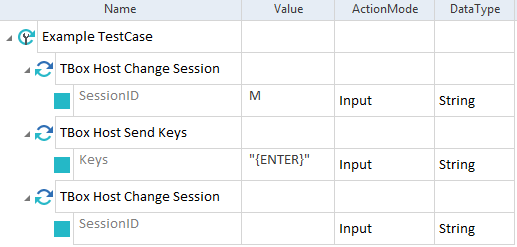HOST Modules
The folder Engines->HOST in the standard subset contains Modules that perform specific tasks for the HOST Engine 3.0.
If you want to steer labels, text boxes, or tables, scan your HOST emulator as described in chapter "Create HOST Modules".
Host Send Keys
The Module Host Send Keys allows you to send specific keys to the HOST application.
It has the following ModuleAttributes:
|
ModuleAttribute |
Description |
|---|---|
|
Keys |
Key(s) that you want to send to the application. Use ActionMode Input. By default, the DataType is RawString. Tosca sends RawString data exactly as entered to the system under test. No need to escape special characters. To use dynamic expressions, select the DataType String |
|
Column |
Column where you want to send the key(s). This ModuleAttribute is optional. If you set it, you have to set Row as well. |
|
Row |
Row where you want to send the key(s). This ModuleAttribute is optional. If you set it, you have to set Column as well. |
The Module can also handle a number of specific keyboard commands as listed in the table below. You can use the values in the columns Microsoft SendKeys and Host Emulator Key interchangeably.
For example, to create a new line, you can specify either {RETURN} or @N as the value for Key.
|
Command |
Microsoft SendKeys |
Host Emulator Key |
|---|---|---|
|
Clear |
{CLEAR} |
@C |
|
Cursor Down |
{DOWN} |
@V |
|
Cursor Left |
{LEFT} |
@L |
|
Cursor Right |
{RIGHT} |
@Z |
|
Cursor Up |
{UP} |
@U |
|
Delete |
{DEL} |
@D |
|
End |
{END} |
@q |
|
Enter |
{ENTER} |
@E |
|
Erase EOF |
N/A |
@F |
|
Home |
{HOME} |
@0 |
|
Insert |
{INSERT} |
@I |
|
Jump (Set Focus) |
{JUMP} |
@J |
|
Left Tab |
{LTAB} |
@B |
|
New Line |
{RETURN} |
@N |
|
PA1 |
N/A |
@x |
|
PA2 |
N/A |
@y |
|
PA3 |
N/A |
@z |
|
Page Down* |
{PAGEDOWN} |
@v |
|
Page Up* |
{PAGEUP} |
@u |
|
PF1/F1 |
{F1} |
@1 |
|
PF2/F2 |
{F2} |
@2 |
|
PF3/F3 |
{F3} |
@3 |
|
PF4/F4 |
{F4} |
@4 |
|
PF5/F5 |
{F5} |
@5 |
|
PF6/F6 |
{F6} |
@6 |
|
PF7/F7 |
{F7} |
@7 |
|
PF8/F8 |
{F8} |
@8 |
|
PF9/F9 |
{F9} |
@9 |
|
PF10/F10 |
{F10} |
@a |
|
PF11/F11 |
{F12} |
@b |
|
PF12/F12 |
{F12} |
@c |
|
PF13 |
{F13} |
@d |
|
PF14 |
{F14} |
@e |
|
PF15 |
{F15} |
@f |
|
PF16 |
{F16} |
@g |
|
PF17 |
{F17} |
@h |
|
PF18 |
{F18} |
@i |
|
PF19 |
{F19} |
@j |
|
PF20 |
{F20} |
@k |
|
PF21 |
{F21} |
@l |
|
PF22 |
{F22} |
@m |
|
PF23 |
{F23} |
@n |
|
PF24 |
{F24} |
@o |
|
|
{PRINT} |
@P |
|
Reset |
{RESET} |
@R |
|
Right Tab |
{TAB} |
@T |
|
Space |
N/A |
@O |
|
*Available only for AS/400 (TN5250) |
||

|
In this example, you create a new line.
Send a command |
Host Change Session
The Module Host Change Session allows you to change HOST emulator sessions during execution.
It has the following ModuleAttribute:
|
ModuleAttribute |
Description |
|---|---|
|
SessionID |
Session ID of the HOST emulator to which you want to switch. Use ActionMode Input. The session ID depends on the emulator you use. Typically, it is located under the API-specific settings of the emulator. If you enter an empty string, the HOST Engine 3.0 deletes the existing session. SessionID is limited to a single character. |

|
If you run tests in the ScratchBook, your results may differ. Tricentis recommends that you use an ExecutionList to run your TestCases. |

|
In this example, you use the first TestStep to switch to the session with the session ID M. In the second TestStep, you send the command Enter to the application. Since the value of the third TestStep is empty, the Host Engine 3.0 deletes the M session.
Switch sessions |

